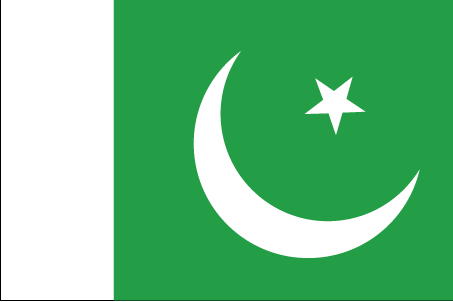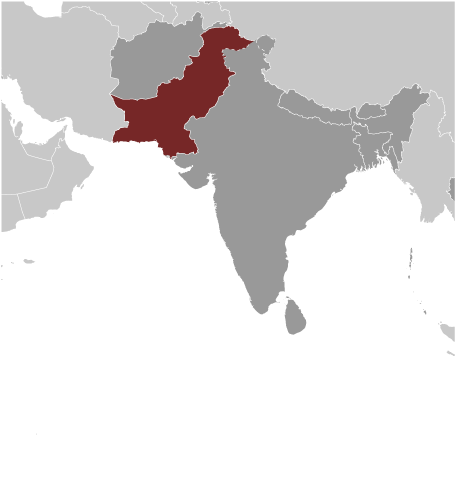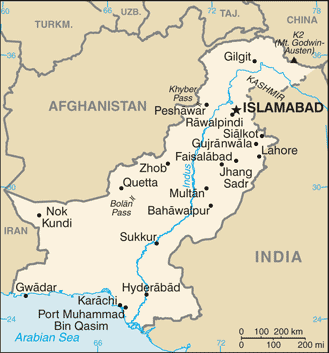The Indus Valley civilization, one of the oldest in the world and dating back at least 5,000 years, spread over much of what is presently Pakistan. During the second millennium B.C., remnants of this culture fused with the migrating Indo-Aryan peoples. The area underwent successive invasions in subsequent centuries from the Persians, Greeks, Scythians, Arabs (who brought Islam), Afghans, and Turks. The Mughal Empire flourished in the 16th and 17th centuries; the British came to dominate the region in the 18th century. The separation in 1947 of British India into the Muslim state of Pakistan (with West and East sections) and largely Hindu India was never satisfactorily resolved, and India and Pakistan fought two wars - in 1947-48 and 1965 - over the disputed Kashmir territory. A third war between these countries in 1971 - in which India capitalized on Islamabad's marginalization of Bengalis in Pakistani politics - resulted in East Pakistan becoming the separate nation of Bangladesh. In response to Indian nuclear weapons testing, Pakistan conducted its own tests in 1998. The dispute over the state of Kashmir is ongoing, but discussions and confidence-building measures have helped the two countries begin to work through their issues. In February 2008, Pakistan held parliamentary elections and in September 2008, after the resignation of former President MUSHARRAF, elected Asif Ali ZARDARI to the presidency. Pakistani government and military leaders are struggling to control domestic insurgents, many of whom are located in the tribal areas adjacent to the border with Afghanistan. India-Pakistan relations have been rocky since the November 2008 Mumbai attacks, but both countries are taking small steps to put relations back on track.
Population
177,276,594 (July 2010 est.)
Country comparison to the world:6
Nationality
Noun:Pakistani(s)
Adjective:Pakistani
Ethnic groups
Punjabi 44.68%, Pashtun (Pathan) 15.42%, Sindhi 14.1%, Sariaki 8.38%, Muhajirs 7.57%, Balochi 3.57%, other 6.28%
Religions
Muslim 95% (Sunni 75%, Shia 20%), other (includes Christian and Hindu) 5%
Languages
Punjabi 48%, Sindhi 12%, Siraiki (a Punjabi variant) 10%, Pashtu 8%, Urdu (official) 8%, Balochi 3%, Hindko 2%, Brahui 1%, English (official; lingua franca of Pakistani elite and most government ministries), Burushaski, and other 8%
Country Name
Conventional long form:Islamic Republic of Pakistan
Conventional short form:Pakistan
Local long form:Jamhuryat Islami Pakistan
Local short form:Pakistan
Former:West Pakistan
Government Type
federal republic
Capital
Name:Islamabad
Geographic coordinates:33 42 N, 73 10 E
Time difference:UTC+5 (10 hours ahead of Washington, DC during Standard Time)
Administrative divisions
4 provinces, 1 territory*, and 1 capital territory**; Balochistan, Federally Administered Tribal Areas*, Islamabad Capital Territory**, Khyber Pakhtunkhwa (formerly North-West Frontier Province), Punjab, Sindh
note: the Pakistani-administered portion of the disputed Jammu and Kashmir region consists of two administrative entities: Azad Kashmir and Gilgit-Baltistan
Independence
14 August 1947 (from British India)
National Holiday
Republic Day, 23 March (1956)
Constitution
12 April 1973; suspended 5 July 1977, restored 30 December 1985; suspended 15 October 1999, restored in stages in 2002; amended 31 December 2003; suspended 3 November 2007; restored on 15 December 2007; amended 19 April 2010
Legal system
based on English common law with provisions to accommodate Pakistan's status as an Islamic state; accepts compulsory ICJ jurisdiction with reservations
Suffrage
18 years of age; universal; joint electorates and reserved parliamentary seats for women and non-Muslims
Executive branch
Chief of state:President Asif Ali ZARDARI (since 9 September 2008)
Head of government:Prime Minister Syed Yousuf Raza GILANI (since 25 March 2008)
Cabinet:Cabinet appointed by the president upon the advice of the prime minister
(For more information visit the World Leaders website)
Elections:the president elected by secret ballot through an Electoral College comprising the members of the Senate, National Assembly, and the provincial assemblies for a five-year term; election last held on 6 September 2008 (next to be held not later than 2013); note - any person who is a Muslim and not less than 45 years of age and is qualified to be elected as a member of the National Assembly can contest the presidential election; the prime minister selected by the National Assembly; election last held on 24 March 2008
Election results:Asif Ali ZARDARI elected president; ZARDARI 481 votes, SIDDIQUE 153 votes, SYED 44 votes; Syed Yousuf Raza GILANI elected prime minister; GILANI 264 votes, Pervaiz ELAHI 42 votes; several abstentions
Legislative branch
bicameral parliament or Majlis-e-Shoora consists of the Senate (100 seats; members indirectly elected by provincial assemblies and the territories' representatives in the National Assembly to serve six-year terms; one half are elected every three years) and the National Assembly (342 seats; 272 members elected by popular vote; 60 seats reserved for women; 10 seats reserved for non-Muslims; members serve five-year terms)
Elections:Senate - last held on 3 March 2009 (next to be held in March 2012); National Assembly - last held on 18 February 2008 with by-elections on 26 June 2008 (next to be held in 2013)
Election results:Senate - percent of vote by party - NA; seats by party - PPPP 27, PML-Q 21, MMA 9, PML-N 7, ANP 6, MQM 6, JUI-F 4, BNP-A 2, JWP 1, NPP 1, PKMAP 1, PML-F 1, PPP 1, independents 13; National Assembly - percent of votes by party - NA; seats by party - PPPP 124, PML-N 91, PML 54, MQM 25, ANP 13, MMA 7, PML-F 5, BNP-A 1, NPP 1, PPP-S 1, independents 17; note - 3 seats remain unfilled
Judicial branch
Supreme Court (justices appointed by the president); Federal Islamic or Sharia Court
Political Parties and Leaders
Awami National Party or ANP [Asfandyar Wali KHAN]; Balochistan National Party-Awami or BNP-A [Moheem Khan BALOCH]; Balochistan National Party-Hayee Group or BNP-H [Dr. Hayee BALOCH]; Balochistan National Party-Mengal or BNP-M [Sardar Ataullah MENGAL]; Jamaat-i Islami or JI [Qazi Hussain AHMED]; Jamhoori Watan Party or JWP; Jamiat Ahle Hadith or JAH [Sajid MIR]; Jamiat Ulema-i Islam Fazlur Rehman or JUI-F [Fazlur REHMAN]; Jamiat Ulema-i Islam Sami-ul HAQ or JUI-S [Sami ul-HAQ]; Jamiat Ulema-i Pakistan or JUP [Shah Faridul HAQ]; Muttahida Majlis-e Amal or MMA [Qazi Hussain AHMED]; Muttahida Qaumi Movement or MQM [Altaf HUSSAIN]; National Alliance or NA [Ghulam Mustapha JATOI] (merged with PML); National Peoples Party or NPP; Pakhtun Khwa Milli Awami Party or PKMAP [Mahmood Khan ACHAKZAI]; Pakistan Awami Tehrik or PAT [Tahir ul QADRI]; Pakistan Muslim League or PML [Chaudhry Shujaat HUSSAIN]; Pakistan Muslim League-Functional or PML-F [Pir PAGARO]; Pakistan Muslim League-Nawaz or PML-N [Nawaz SHARIF]; Pakistan Peoples Party Parliamentarians or PPPP [Bilawal Bhutto ZARDARI, chairman; Asif Ali ZARDARI, co-chairman]; Pakistan Peoples Party-SHERPAO or PPP-S [Aftab Ahmed Khan SHERPAO]; Pakistan Tehrik-e Insaaf or PTI [Imran KHAN]; Tehrik-i Islami [Allama Sajid NAQVI]
note: political alliances in Pakistan can shift frequently
Political pressure groups and leaders
Other:military (most important political force); ulema (clergy); landowners; industrialists; small merchants
International organization participation
ADB, ARF, C, CICA, CP, D-8, ECO, FAO, G-24, G-77, IAEA, IBRD, ICAO, ICC, ICRM, IDA, IDB, IFAD, IFC, IFRCS, IHO, ILO, IMF, IMO, IMSO, Interpol, IOC, IOM, IPU, ISO, ITSO, ITU, ITUC, MIGA, MINURCAT, MINURSO, MONUC, NAM, OAS (observer), OIC, OPCW, PCA, SAARC, SACEP, SCO (observer), UN, UNAMID, UNCTAD, UNESCO, UNHCR, UNIDO, UNMIL, UNMIS, UNMIT, UNOCI, UNWTO, UPU, WCO, WFTU, WHO, WIPO, WMO, WTO
Diplomatic representation in the US
Chief of mission:Ambassador Husain HAQQANI
Chancery:3517 International Court, Washington, DC 20008
Telephone:[1] (202) 243-6500
FAX:[1] (202) 686-1544
Consulate(s) general:Boston (Honorary Consulate General), Chicago, Houston, Los Angeles, New York
consulate(s): Chicago, Houston
Diplomatic representation from the US
Chief of mission:Ambassador Anne W. PATTERSON
Embassy:Diplomatic Enclave, Ramna 5, Islamabad
Mailing address:P. O. Box 1048, Unit 62200, APO AE 09812-2200
Telephone:[92] (51) 208-0000
FAX:[92] (51) 2276427
consulate(s) general: Karachi
consulate(s): Lahore, Peshawar
Flag description
green with a vertical white band (symbolizing the role of religious minorities) on the hoist side; a large white crescent and star are centered in the green field; the crescent, star, and color green are traditional symbols of Islam










